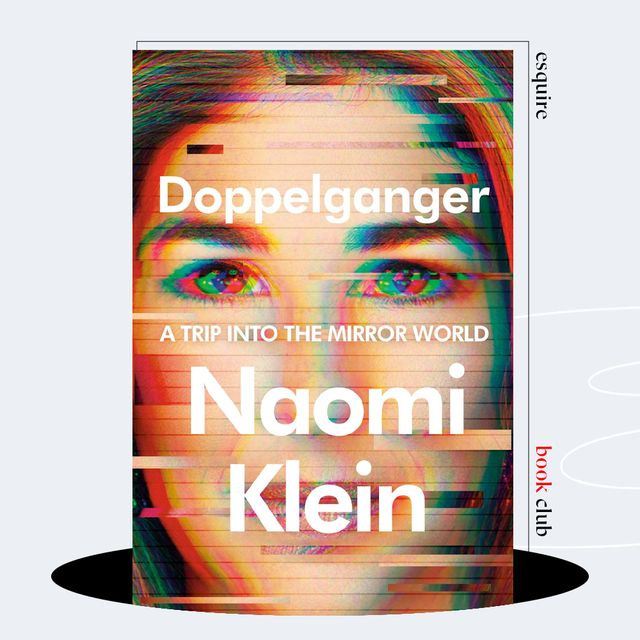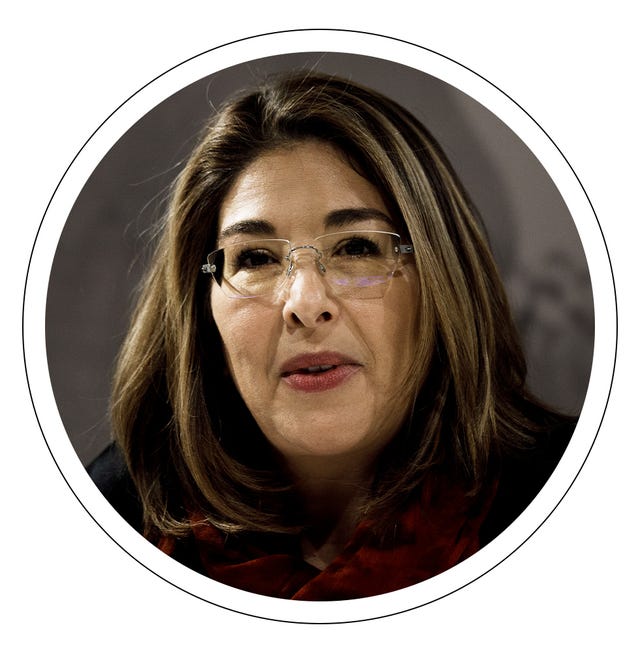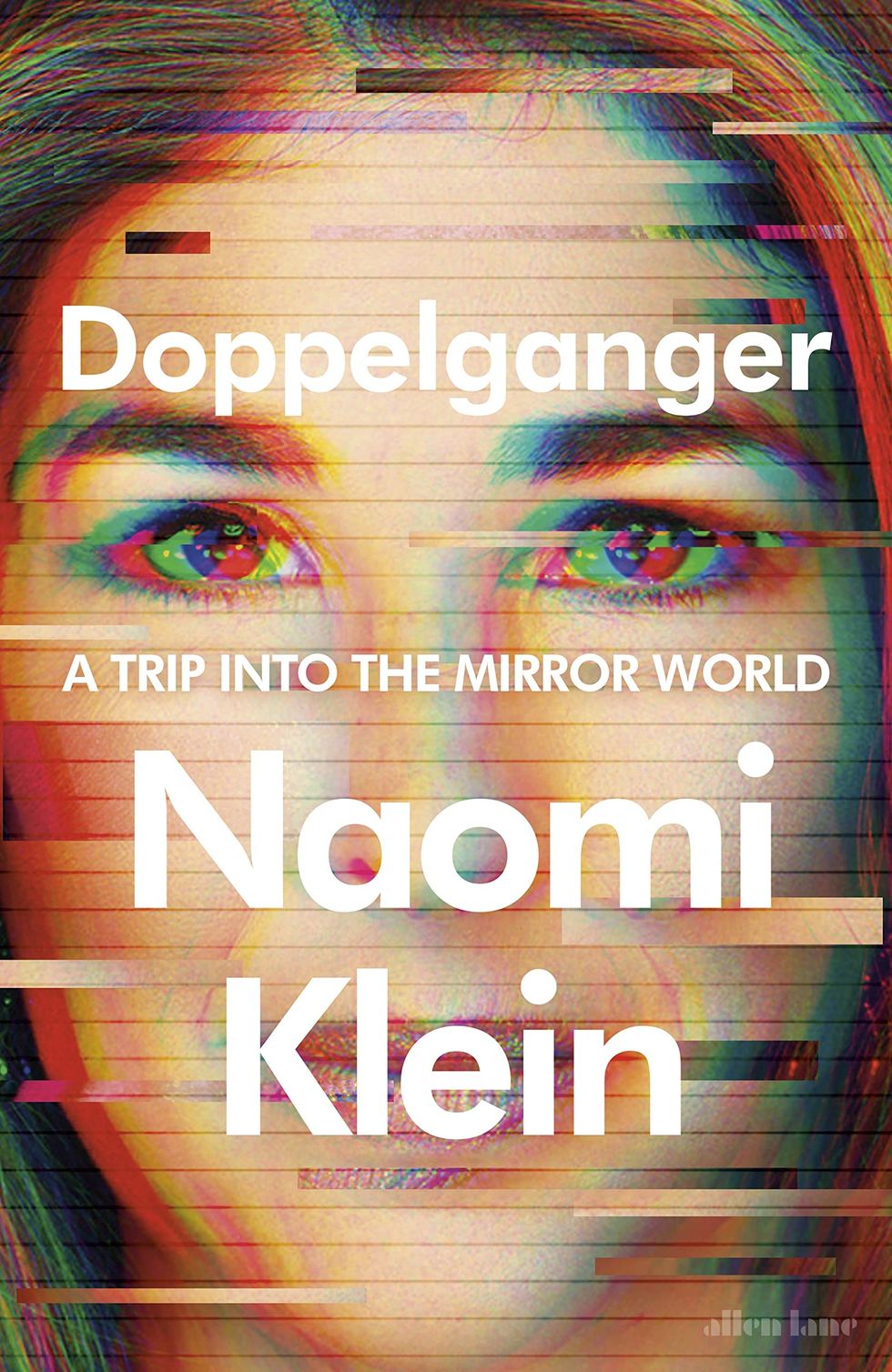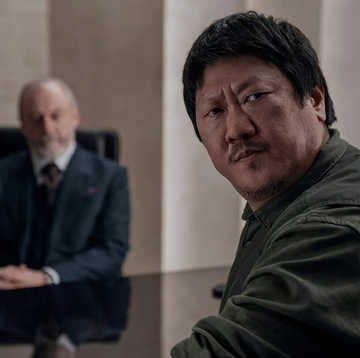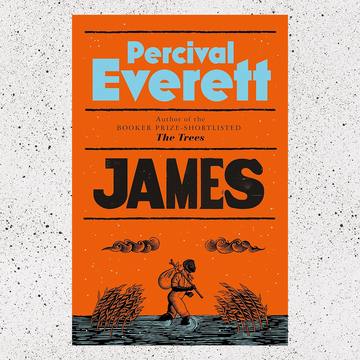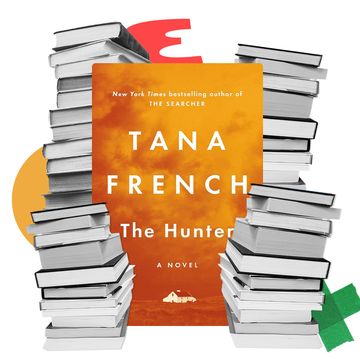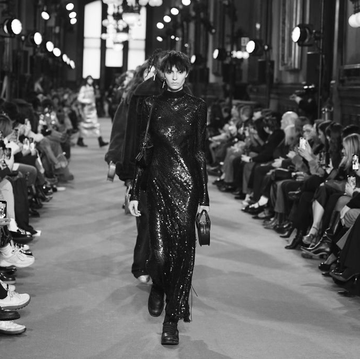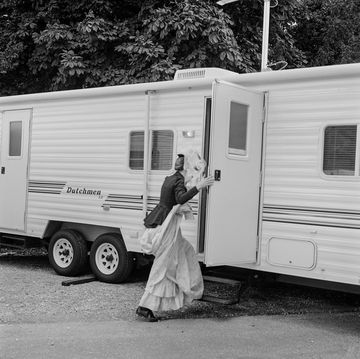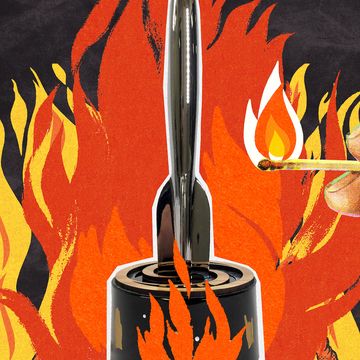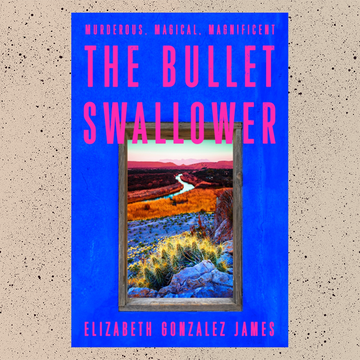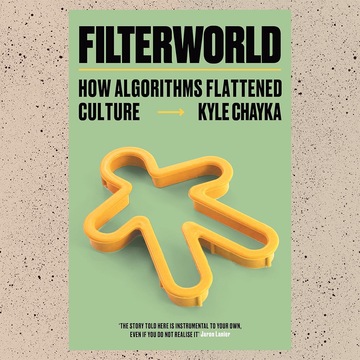“In my defence, it was never my intent to write this book.”
So begins Naomi Klein’s Doppelganger: A Trip Into the Mirror World. It all began when Klein, the liberal activist and blockbuster writer behind bestsellers like The Shock Doctrine and This Changes Everything, became regularly mistaken for Naomi Wolf, the liberal feminist author of The Beauty Myth turned conspiracy theorist and anti-vaxxer. The similarities between Klein and “Other Naomi” seemed uncanny: “We both write big-idea books,” Klein writes, and “have brown hair that sometimes goes blond from over-highlighting.” At times, the overlap is stranger than fiction: for instance, both women are married to men named Avram. Amid a decade of defending her own reputation against Wolf’s escalating conservatism, Klein tail-spinned into obsession, tracking Wolf’s right-wing media appearances in a quest to understand her “flight from reality.” But the book’s outlook is far broader than Klein’s own doppelgänger trouble. “The book is not about my doppelgänger; my doppelgänger is just the white rabbit leading me down the rabbit hole,” she tells Esquire. It's very much about what I find down there, who else I find down there, and what it says about us.”
Klein’s doppelgänger trouble opens outward onto a roving survey of how doubling organises our social and political lives. The concept of the doppelgänger, she insists, can help us understand our uncanny political moment, where “millions of people have given themselves over to fantasy.” Klein’s analysis includes a new taxonomy of useful coinages, like “the Mirror World,” the manic surreality inhabited by far-right movements, and “the Shadow Lands,” where our unseen doubles perform brutal labor in factories and fields to provide the conveniences we take for granted, like “our Amazon deliveries” and “our year-round fruit.” Doppelgänger is a lucid frame on conspiracy movements and digital doubling, but also a powerful implication of the double lives we choose to ignore. “What we’re not willing to look at is our own complicity in systems that are intimately connected with the genocides of the past, that are contributing our little bit of poison to the extinctions of the present and the future,” Klein tells Esquire.
Klein Zoomed with Esquire from her home in British Columbia to discuss double trouble in American politics, the surrealist nightmare of life online, and the importance of building "uncomfortable coalitions." This conversation has been edited for length and clarity.
ESQUIRE: What was the moment when your doppelgänger trouble began to suggest a broader political framework?
NAOMI KLEIN: I think when it started to manifest where I live. During the pandemic, I moved to a remote community—it’s three hours from the nearest city, including a ferry boat ride. It's called the Sunshine Coast, British Columbia. It's beautiful here, but it was always a place where I went to hide. I wrote The Shock Doctrine and other books here. When I moved here, I I had been lightly following what was going on with my doppelgänger—much of it not by choice, but because my social media feed would fill with blowback whenever she would do things. Then I started to see more examples of it in this small rural community where I live. There was the largest protest I've ever seen here on the coast: a “medical freedom” protest outside the hospital, opposing vaccine mandates for hospital staff. I also started to see signs and graffiti. I thought, “If it’s showing up even here, then it's worth examining, and it's bigger than me.” The book is not about my doppelgänger; my doppelgänger is just the white rabbit leading me down the rabbit hole. It's very much about what I find down there, who else I find down there, and what it says about us.
You write that doppelgängers have been understood as “warnings or harbingers” that suggest “something important is being ignored or denied—a part of ourselves and our world we do not want to see.” What are we hiding from?
When I say “we,” I mean people who consider ourselves “not them,” and by “them,” I mean conspiracy theorists and MAGA people who seem to have taken flight from reality voluntarily. We spend a lot of time feeling smug that we aren’t “like them” and defining ourselves against them in a way that’s quite flattering. Doppelgänger literature shows that we may think we're confronting our doppelgänger, but in the end, we’re always confronting ourselves. What we’re not willing to look at is our own complicity in systems that are intimately connected with the genocides of the past, that are contributing our little bit of poison to the extinctions of the present and the future, that rely on Shadow Lands for our conveniences, our Amazon deliveries, our year-round fruit. Whatever it is, there is no them. We are in it. We are a part of it.
By projecting all of our worst selves onto others, we avoid looking at our own complicity. I'm not about making people feel bad about that—I'm about asking, “What do we do about it? How do we build a world that does not require these kinds of violences?” There are moments when it felt like that might be possible. Think about the racial justice uprising after the murder of George Floyd, or the huge numbers of people who participated in the climate strikes in 2019 before the pandemic. There are moments when it feels like we want to do better, but because we haven't figured out how to sustain those movements and turn them into material policies that improve people's lives, the need for distraction and projection remains.
At this point, many people have written off Steve Bannon as a fringe character, but you see him as someone with huge influence. Why do you see him as such a powerful figure?
Underestimating Steve Bannon's influence is pretty much always a mistake. In general, I think there's an impulse to dismiss people who aren't present in mainstream liberal culture as basically of no importance. A lot of people responded to my doppelgänger that way—there was a lot of attention on her in the early pandemic because she was spreading misinformation, but once she was de-platformed, the attitude was basically like she'd been deleted from planet Earth. Because I was following where she was going, I was struck that she had a much larger following than she’d had in years. There’s a flattering comfort in pretending that we have the power to deny these people attention and therefore influence, but actually, their worlds are real. There are real people there, and they can change the real world that we all inhabit—as we saw with Trump's election. But we've also seen strange new political formations in Italy with the election of Giorgia Meloni, another of these diagonal characters who combines parts of our new age with authoritarianism. There was also an attempted coup in Germany, which had conspiratorial elements to it. So these movements have real world impacts.
Bannon has a huge following. I’ve talked to so many people who say, “I can't talk to my sister anymore.” Their uncle, their aunt—so many of us have people like this in their lives, who we don't understand where they're getting their ideas from. Chances are, it's from one of these podcasts that are being dismissed as not important. Bannon broadcasts every single day—some of his shows are three hours long. These are intimate relationships. He really gets in people's heads in a way that maybe traditional media doesn't.
How does your theory of the mirror world help us understand this moral panic about “cancel culture”? As you say, mainstream liberal culture considers people like Bannon and your doppelgänger “cancelled” or “deleted.” But as you point out in the book, “These people don't just disappear because we can no longer see them. They go somewhere else.”
I don't use the term cancel culture because I think it's just become one of those terms that's not particularly useful. I'm really just talking about something simpler, which is that we should treat each other with more generosity. I talk about the mirror world being separated by one-way glass in the sense that we don't see them, but they're looking at us. Bannon is studying us very closely, including the issues that used to be traditional issues of the left, like opposition to free trade deals, consolidating corporate power, and opposition to Big Pharma and Big Tech. He’s seeing that mainstream liberalism isn’t offering much on these issues, so he's taking up these issues—not because he believes in it or cares about it, but because he sees that they are potent issues, in the same way he understood in 2016 that free trade was an issue that could bring a bunch of traditional democratic voters over to the MAGA side.
The other thing he notices when he looks at us is that a lot of people get discarded. A lot of people get excluded. He does this show of performative inclusion, saying, “We believe in debate.” Obviously these are the same people banning books. They don't believe in debate; they don't believe in free speech. But there's an overperformance of it as a way to exploit a real feeling that a lot of people have: that they're afraid of making a mistake, and there’s no leeway for screwing up. This is related to the way I write about the cost of personal branding. We create these online avatars or personal brands, which are sort of us, but not us. The problem with performing being a thing on a platform where countless other people are performing themselves as things is that we actually start to believe we aren't real, and that other people aren’t real. And if we aren't real, then all kinds of cruelties are possible.
You write that “many of us have begun to suspect that we are machine food,” as our private actions are “enclosed” and “extracted” by Big Tech. You warn how our digital selves are a kind of doppelgänger, partitioned off from the complete truth of who we are. Do you see any signs that people are waking up to these truths and pushing for change?
I am seeing signs. My experience of teaching people in their twenties is that those people who have come to stand in for their generation are not representative of their whole generation. A lot of young people are very troubled, even the ones who are very online, by what this performed self is doing, and this idea of not knowing what’s performed and what’s real. This is anecdotal, but a lot of the young people who I talk to and who I teach have a very ambivalent relationship with the partitioning of the self required to be a good brand.
We're never going to not care about ourselves. I'm not calling for an annihilation of the self or the ego. I don't think that's possible or even desirable. But I do think we live in a culture where the self takes up too much space, and given the scale of the crises we are up against and the fact that we will only have a hope of doing anything about it if we can band together and organise ourselves into political constituencies, the labor of perfecting, optimising, and performing the self really does rob necessary hours in the day when we might be doing things with other people.
As I was reading the chapter about our digital selves and our personal brands, I lamented that the book was completed before this current AI panic really gripped the culture, because it seems so germane to the topics at hand. Is there a doppelgänger lens on AI?
Oh, absolutely. In the book, I write about the digital golems created with our data. There's the double self we consciously create, but then there's the self that the tech companies create by hoovering up our data trails and creating doubles that then target market to us. This also creates the possibility for AI doubles. AI is a mirroring and mimicry machine that seems to be creating something new, but all it can do is mirror ourselves back to us. I certainly have friends who are visual artists and musicians who have had that absolutely chilling, uncanny feeling of seeing doppelgänger versions of themselves that they did not create, that others created, that were trained on their art, who they now they have to compete with in order to make a living as an artist. It’s one thing to have to compete with other people, but it's quite another thing to have to compete with a counterfeit copy of yourself, whipped up by someone else. We can have a debate about whether or not art should be commerce, but we live under capitalism, and this is really a frightening state of affairs. I believe it’s a form of theft. I don't see why a private for-profit company should be allowed to train their algorithms on the work, the words, and the images of people, without their consent, then sell the tools to people who are going to use them to cut costs.
It very much relates to the drivers of conspiracy culture. We have malevolent actors like Bannon who want people not to believe what is right in front of them, because it's very helpful to the Donald Trumps of the world if people don't believe anything said about him is true. If you're going to break a whole bunch of laws, that’s pretty helpful. That’s why conspiracy culture supports elite actors, even though the people spreading these theories position themselves as anti-elite. When you introduce AI into this mix, it's not going to be helpful when it comes to sorting fact from fiction and trying to get ourselves to a shared reality. That’s the precondition for doing anything to combat the serious and very real things happening in the world today, including climate change.
The book arrives at an argument that to make systemic change, we have to work together and battle systems of uncare to build new systems of care. How do we start to think collectively and build these coalitions, especially the “uncomfortable coalitions,” as you call them? What does that look like in practice?
Part of the cost of social media is that it doesn't create many coalitions. There's a lot of talk and there are a lot of takes, but there aren’t many spaces where there's strategic thinking about long-term strategy and goals. But there are attempts to create more of those spaces, like the work of Keeanga-Yamahtta Taylor, who started this new online journal called Hammer & Hope, which is a space to think critically about coalition work from a Black perspective. It very clearly looks at identity politics as a position from which to enter into struggle that recognises that our positions are not the same—that we come to coalition with very different experiences and very different levels of risk. That’s not a reason not to be in coalition, but it informs how we see the world, which is the original meaning of the term identity politics from the Combahee River Collective.
I think we need a higher threshold for disagreement and debate. We need not to see disagreement as cataclysmic. We also need to give each other a little bit more grace, which isn’t an argument for not holding each other accountable, but for more democracy within our movements. In organising spaces, if you don't like what somebody is doing and they're in a position of seeming leadership, there has to be a way to hold them accountable other than just the callout. That’s so often not the case when there's an organization and there are a few people at the top, but they're not accountable to a base.
As I say in the book, most things are easier said than done, but some things are easier done than said. That’s building on the work of wonderful labor organiser and theorist named Jane McAlevey, who writes about union organising particularly in the teaching and nursing sectors, where there’s a lot of racial diversity and status differences. When there’s a clear goal across the board, like raises or benefits, the ability to be in those uncomfortable coalitions becomes more possible. Whereas if all you’re doing is sharing opinions on social media, it isn't clear what the goal is at all. If you don’t know what the point of the whole thing is, your differences are going to take you down. But if the point is clear and the strategy is clear, then your tolerance level for difference rises, because you understand why you're tolerating it. If you don't have a goal, then why tolerate anything?
What gives you hope that we’ll make it to this caring world you want to build?
I think it's having been around for long enough to know that history can surprise you. For example: I wrote a book about the climate crisis that came out in 2014, called This Changes Everything. It called for a truly intersectional climate movement at a time when the mainstream climate movement was not interested in connecting the dots between racial justice, gender justice, disability rights, and Indigenous rights. When I wrote that book, I could not in a million years have predicted Greta Thunberg and the rise of the Climate Strike movement. In my wildest dreams, I could not have predicted The Squad and the Sunrise Movement doing so much on a Green New Deal that every presidential candidate felt they needed to stake out a position on it.
So history surprises you. Things happen that were not on your bingo card, for better and worse. I'm not somebody who's hopeful all the time, but I guess I would say that I'm humble enough to know that I don't know what's coming. There will be another moment when people have just had enough, and we better be ready, because in the Mirror World, they're ready with their plans, and their plans aren’t good. But I'm hopeful because I've been surprised enough times that I believe I will be surprised again. And I believe we have to be ready to sustain that moment and turn it into real action.
Adrienne Westenfeld is the Books and Fiction Editor at Esquire, where she oversees books coverage, edits fiction, and curates the Esquire Book Club.
